Toyota Land Cruiser VS Jaguar E-Pace – Specs, Efficiency & Price Comparison
Which model is the better choice – the Toyota Land Cruiser or the Jaguar E-Pace? We compare performance (205 HP vs 269 HP), boot capacity (742 L vs 494 L), efficiency (10.30 L vs 1.40 L), and of course, the price (58300 £ vs 32400 £).
Find out now which car fits your needs better!
The Toyota Land Cruiser (Off-Roader) is powered by a Diesel engine and comes with a Automatic transmission. In comparison, the Jaguar E-Pace (SUV) features a Plugin Hybrid, Diesel MHEV or Petrol MHEV engine and a Automatic gearbox.
When it comes to boot capacity, the Toyota Land Cruiser offers 742 L, while the Jaguar E-Pace provides 494 L – depending on what matters most to you. If you’re looking for more power, you’ll need to decide whether the 205 HP of the Toyota Land Cruiser or the 269 HP of the Jaguar E-Pace suits your needs better.
There are also differences in efficiency: 10.30 L vs 1.40 L. In terms of price, the Toyota Land Cruiser starts at 58300 £, while the Jaguar E-Pace is available from 32400 £.
Compare all the key specs now and find out which model fits your lifestyle best!
Toyota Land Cruiser
The Toyota Land Cruiser is renowned for its robust durability and exceptional off-road capabilities. Its design combines a rugged exterior with a comfortable and functional interior, appealing to both adventure seekers and city drivers. The vehicle's reliability and advanced technology make it a popular choice for those who require a dependable SUV that can handle a variety of terrains with ease.
details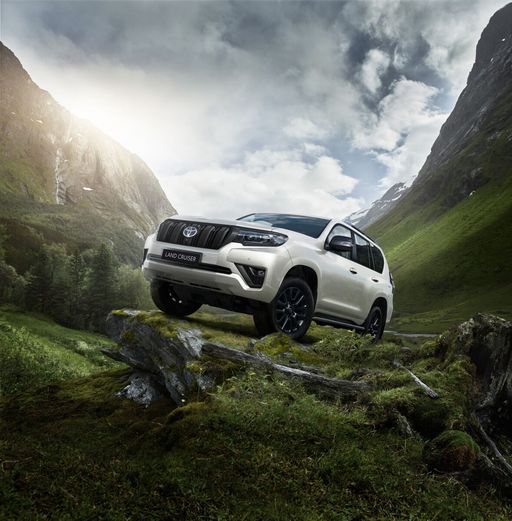 @ Toyota
@ Toyota
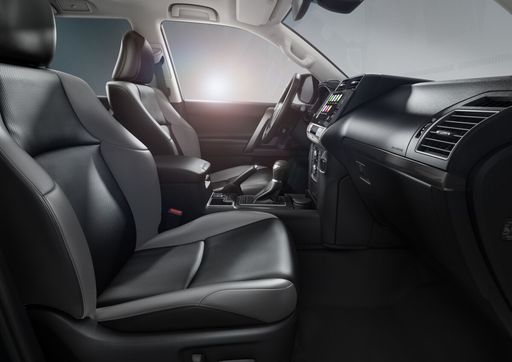 @ Toyota
@ Toyota
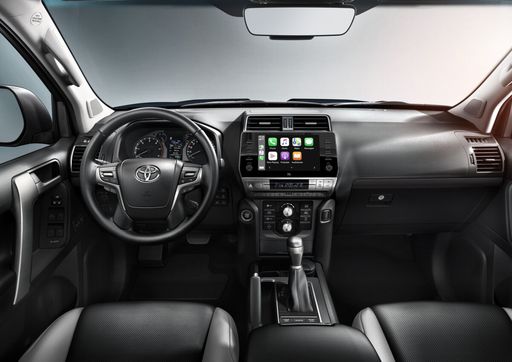 @ Toyota
@ Toyota
Jaguar E-Pace
The Jaguar E-Pace is a compact SUV that combines the brand's signature luxury with a dynamic driving experience. Its sleek design features graceful lines and an assertive stance, making it a standout on any road. Inside, the E-Pace boasts a meticulously crafted interior with high-quality materials and advanced technology, providing both comfort and connectivity for drivers and passengers alike.
details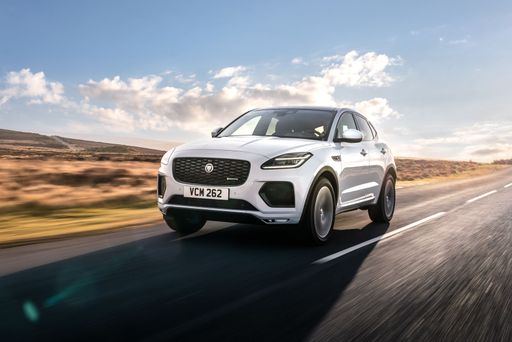 @ media.jaguar.com
@ media.jaguar.com
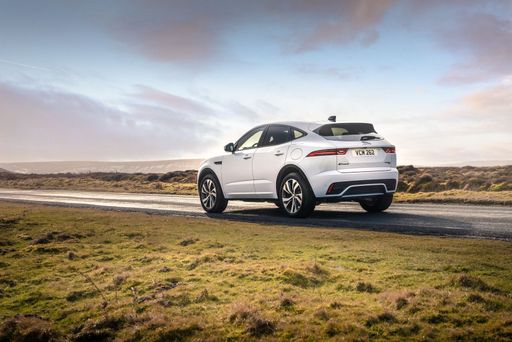 @ media.jaguar.com
@ media.jaguar.com
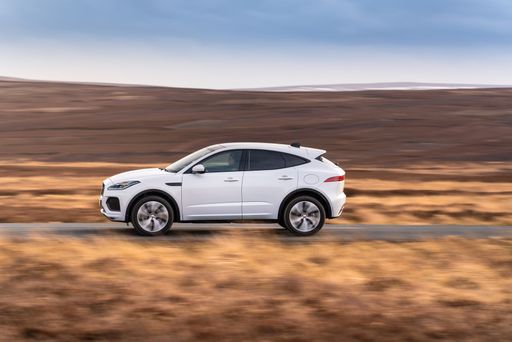 @ media.jaguar.com
@ media.jaguar.com
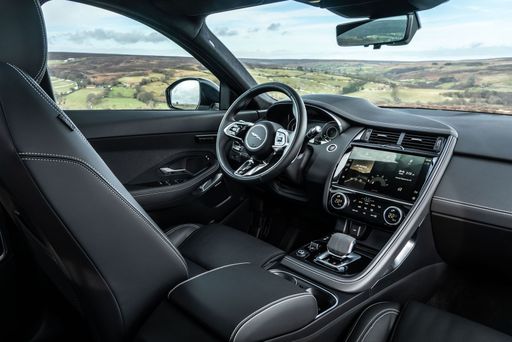 @ media.jaguar.com
@ media.jaguar.com
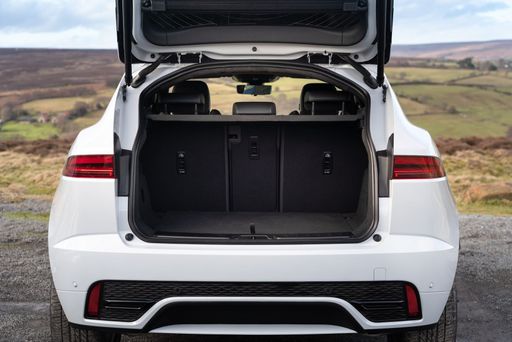 @ media.jaguar.com
@ media.jaguar.com

|

|
|
|
|
Costs and Consumption |
|
|---|---|
|
Price
58300 - 78400 £
|
Price
32400 - 56100 £
|
|
Consumption L/100km
10.30 L
|
Consumption L/100km
1.4 - 8.2 L
|
|
Consumption kWh/100km
-
|
Consumption kWh/100km
-
|
|
Electric Range
-
|
Electric Range
69 km
|
|
Battery Capacity
-
|
Battery Capacity
11.50 kWh
|
|
co2
272 g/km
|
co2
33 - 185 g/km
|
|
Fuel tank capacity
80 L
|
Fuel tank capacity
56 - 67 L
|
Dimensions and Body |
|
|---|---|
|
Body Type
Off-Roader
|
Body Type
SUV
|
|
Seats
5
|
Seats
5
|
|
Doors
5
|
Doors
5
|
|
Curb weight
2410 - 2550 kg
|
Curb weight
1783 - 2173 kg
|
|
Trunk capacity
130 - 742 L
|
Trunk capacity
494 L
|
|
Length
4925 mm
|
Length
4395 mm
|
|
Width
1980 mm
|
Width
1984 mm
|
|
Height
1935 mm
|
Height
1648 mm
|
|
Payload
600 - 690 kg
|
Payload
497 - 554 kg
|
Engine and Performance |
|
|---|---|
|
Engine Type
Diesel
|
Engine Type
Plugin Hybrid, Diesel MHEV, Petrol MHEV
|
|
Transmission
Automatic
|
Transmission
Automatic
|
|
Transmission Detail
Automatikgetriebe
|
Transmission Detail
Automatic Gearbox
|
|
Drive Type
All-Wheel Drive
|
Drive Type
All-Wheel Drive, Front-Wheel Drive
|
|
Power HP
205 HP
|
Power HP
160 - 269 HP
|
|
Acceleration 0-100km/h
-
|
Acceleration 0-100km/h
7.3 - 10.5 s
|
|
Max Speed
170 km/h
|
Max Speed
190 - 211 km/h
|
|
Torque
500 Nm
|
Torque
260 - 540 Nm
|
|
Number of Cylinders
4
|
Number of Cylinders
3 - 4
|
|
Power kW
151 kW
|
Power kW
118 - 198 kW
|
|
Engine capacity
2755 cm3
|
Engine capacity
1498 - 1998 cm3
|
General |
|
|---|---|
|
Model Year
2024
|
Model Year
2024
|
|
CO2 Efficiency Class
G
|
CO2 Efficiency Class
B, G
|
|
Brand
Toyota
|
Brand
Jaguar
|
Toyota Land Cruiser
Introducing the Toyota Land Cruiser: A Legend Reinvented
The Toyota Land Cruiser is a name synonymous with reliability, durability, and off-road prowess. The latest iterations continue this legacy while incorporating cutting-edge technology and refined engineering to meet the demands of modern adventurers. Whether you're navigating rugged terrains or cruising city streets, the Land Cruiser promises an unparalleled driving experience.
Innovative Engineering and Powertrain
Under the bonnet, the Land Cruiser offers a 2.8-litre D-4D diesel engine, delivering an impressive 204 PS. This robust engine ensures a blend of power and efficiency, capable of handling any terrain with ease. Available in both manual and automatic transmissions, the vehicle caters to a wide range of driving preferences. With a torque ranging from 420 to 500 Nm, it provides enough grunt to tackle the most challenging conditions.
Performance and Efficiency
The Land Cruiser exhibits remarkable performance, accelerating from 0 to 100 km/h in just 9.9 seconds in select variants. Despite its formidable capabilities, the vehicle manages to maintain a commendable fuel consumption rate, ranging from 8.7 L/100km to 13.4 L/100km, depending on the configuration. The model achieves a maximum speed of 175 km/h, demonstrating its competence on both highways and off-road trails.
Design and Dimensions
Standing at a length between 4395 mm and 4920 mm, the Land Cruiser strikes a balance between robust stance and practical urban driving. Its width ranges from 1885 mm to 1980 mm, and it features a height between 1830 mm and 1870 mm. The SUV offers both three-door and five-door configurations, accommodating diverse lifestyle needs. Its spacious interior can be configured to seat between five to seven passengers, ensuring comfort on long journeys.
Off-Road Capability and Utility
Renowned for its off-road credentials, the Land Cruiser is equipped with a sophisticated all-wheel-drive system. It features a high ground clearance, allowing it to traverse uneven terrains without difficulty. The vehicle's payload capacity ranges from 495 kg to 770 kg, and its ample boot space — ranging from 104 L to 1151 L — caters to adventurous excursions as well as everyday practicalities.
Technological Features and Innovations
The latest Land Cruiser models are outfitted with advanced technological features designed to enhance both comfort and safety. From state-of-the-art infotainment systems to cutting-edge driver assistance technologies, this SUV ensures a connected and secure driving experience. With a range of trim levels available, including Executive and First Edition variants, the Land Cruiser offers a suite of luxury amenities tailored to discerning drivers.
Sustainability and Environmental Considerations
While the Land Cruiser is engineered for performance, Toyota also takes environmental impact into account. The models feature CO2 emissions ranging from 227 g/km to 288 g/km and a fuel efficiency rating classified under CO2-efficiency class G. These efforts reflect Toyota's commitment to reducing the environmental footprint of its vehicles while delivering unparalleled capability.
Conclusion: A Timeless Companion
The Toyota Land Cruiser remains an indomitable force in the world of four-wheel drives, combining enduring reliability with modern innovation. Whether it's exploring untamed wilderness or making a statement on urban roads, the Land Cruiser stands as a testament to Toyota’s engineering excellence. For adventurers seeking uncompromised performance and luxury, the Land Cruiser is poised to be a steadfast companion for years to come.
Jaguar E-Pace
The Jaguar E-Pace: A Modern Marvel in Compact SUV Design
The Jaguar E-Pace stands as a testament to the evolution of compact SUVs, merging classic design elements with cutting-edge technology. For those who appreciate the Jaguar pedigree, the E-Pace offers a blend of performance, style, and practicality that is hard to rival in its class.
Performance and Powertrain Options
Under the bonnet, the Jaguar E-Pace showcases a range of powertrains that cater to various driving preferences. Potential buyers can choose from plug-in hybrids, diesel mild-hybrids, and petrol mild-hybrids, each offering a unique balance of efficiency and power. The available engine options span from 160 to 269 PS, ensuring that drivers can select a model that suits their need for speed and fuel efficiency. Across the range, the acceleration from 0-100 km/h varies between a brisk 7.3 seconds to a more leisurely 10.5 seconds, showcasing versatility in design to meet different driving styles.
Innovative Hybrid Technologies
Jaguar's commitment to sustainability is evident in the E-Pace's hybrid offerings. The P270e Plug-in Hybrid variant combines performance with eco-friendly engineering, boasting a remarkable fuel consumption of just 1.4 L/100km and an all-electric range of up to 69 km. Meanwhile, the diesel mild-hybrids provide a balanced mix of efficiency and traditional power, catering to those who favour diesel engines' long-haul credibility with carbon emissions ranging from a low 33 g/km.
Dynamic Handling and Intelligent All-Wheel Drive
Driving dynamics are at the heart of the E-Pace's design. Jaguar's Intelligent All-Wheel Drive ensures optimal performance across various terrains, enhancing both stability and agility. For those seeking a dynamic driving experience, the R-Dynamic packages add a sporty flair, elevating both aesthetic and on-road performance.
Interior Sophistication and Practicality
The interior of the E-Pace reflects Jaguar's attention to detail, offering a meticulously crafted cabin that combines luxury with functionality. Supporting up to five passengers comfortably, it provides advanced infotainment systems and high-quality materials throughout. The 494-litre boot space ensures ample room for luggage, making it a practical choice for everyday use or weekend getaways.
A Focus on Safety and Driver Assistance
Safety remains at the forefront of the E-Pace's features, with an array of driver-assistance systems designed to enhance security and ease of driving. From adaptive cruise control to lane-keeping assist, the vehicle is equipped to handle the demands of modern motoring.
Conclusion: The Ideal Compact SUV
The Jaguar E-Pace is more than just a statement of style; it's a comprehensive package that addresses the needs of the modern driver. With a price range from €37,800 to €65,500, the E-Pace strikes a balance between luxury and practicality, making it a compelling choice in the competitive compact SUV market.
The prices and data displayed are estimates based on German list prices and may vary by country. This information is not legally binding.
